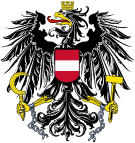| |||||||||||||||||||||||||||||||||||||||||
All 183 seats in the National Council 92 seats needed for a majority | |||||||||||||||||||||||||||||||||||||||||
|---|---|---|---|---|---|---|---|---|---|---|---|---|---|---|---|---|---|---|---|---|---|---|---|---|---|---|---|---|---|---|---|---|---|---|---|---|---|---|---|---|---|
| |||||||||||||||||||||||||||||||||||||||||
 Results by state | |||||||||||||||||||||||||||||||||||||||||
| |||||||||||||||||||||||||||||||||||||||||
| This article is part of a series on the |
| Politics of Austria |
|---|
 |
Parliamentary elections were held in Austria on 6 May 1979. [1] The Socialist Party won a fourth term in government, taking 95 of the 183 seats. Voter turnout was 92.2%. [2] As of the 2024 elections, this is the most seats that an Austrian party has won in a free election, as well as the last time that an Austrian party has won an outright majority.





